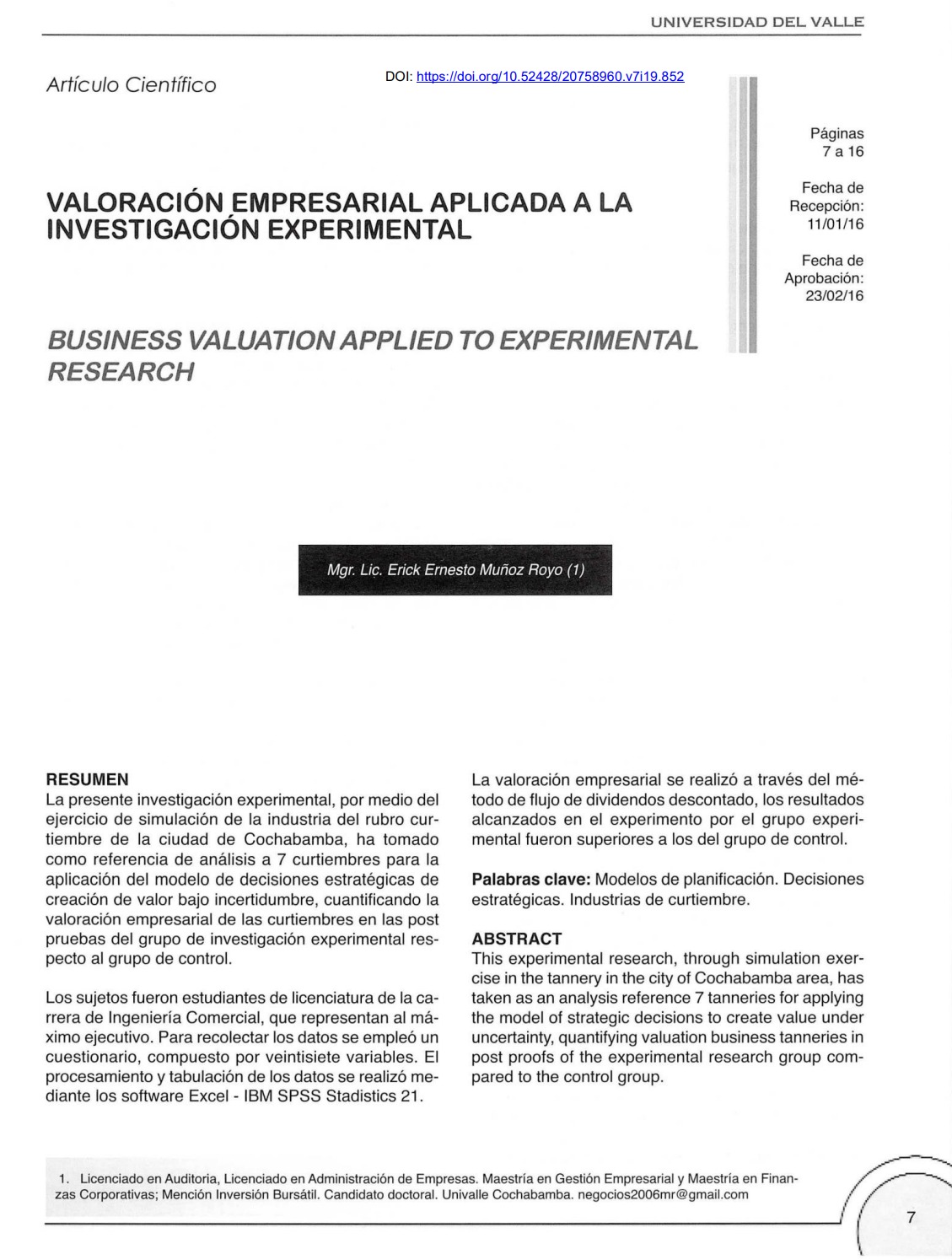Business Valuation Applied to Experimental Research
DOI:
https://doi.org/10.52428/20758960.v7i19.852Keywords:
Planning models, Strategic decisions, Tannery industriesAbstract
This experimental research, through simulation exercise in the tannery in the city of Cochabamba area, has taken as an analysis reference 7 tanneries for applying the model of strategic decisions to create value under uncertainty, quantifying valuation business tanneries in post proofs of the experimental research group cornpared to the control group. Subjects were Commercial Engineering undergraduate, representing the highest executive. To collect the data a questionnaire was composed by twenty seven variables. Processing and tabulation of the data was performed using Excel software IBM SPSS Stadistics 21. Business valuation was carried out through flow method discounted dividends; the results achieved in the experiment by the experimental group were higher than those in the control group.
Downloads
References
QUERO, L. Competitives Stategies: a key tactors ot Development. NEGOTIUM Scientitic e-journal ot Management Science 2008. 10 (4) 2008; 36-49 [R: 2007- 12 / A: 2008-03). https://doi.org/10.1080/09747338.2008.11673797
LÓPEZ, LUBÍAN. Valoración de Empresas en la Práctica. Madrid: McGraw-Hill/lnteramericana de España; 2001.
ROS & WESTERFIELD & JAFFE. Finanzas Corporativas. México, D.F.: McGraw-Hill/lnteramericana Editores, S.A.; 2005.
FERNANDEZ Y SANTOMA. Finanzas para Directores. España: S.A. EUNSA. Ediciones Universidad de Navarra; 2005. https://doi.org/10.1080/09747338.2008.11673797
MASCAREÑAS, J. Fusiones y Adquisiciones de Empresas. Madrid: McGraw-Hill/lnteramericana de España, S.A.U.; 2000.
GARCÍA, A. El Método Experimental en Economía. LEE y Opto. de Economía, UJI 2011. Kreutzer, M. & Neunzig, W. En torno a la Investigación Empírica en el Campo de la Traductología. Quaderns Revista de Traducción 1998; 1 (1): 1-9.
KREUTZER, M. & NEUNZIG, W. En torno a la Investigación Empírica en el Campo de la Traductología. Quaderns Revista de Traducción 1998; 1 (1): 1-9.
AIDAR, A. & MIRAGE, GU. Individual Achievement Does not Guarantee Team Performance: An Evidence ot Organizational Learning With Business Games. Developments in Business Simulations and Experiential Learning 2005; Volume 32.
AIDAR, A. Jogos de empresas e economia experimental: um estudo da racionalidade organizacional natomada de decisáo. Rev. Adm. Contemp 2009; vol.13 (2):1-22. https://doi.org/10.1590/S1415-65552009000200003
Brandts, J. y Charness G. The Strategy versus the Direct-response Method: A Survey ot Experimental Comparisons 2009.
BIELECKI, W. & WARDASZKO, M .. Mission Possible - Using Simulation Games For Management Training in a Transition Economy. Developments in Business Simulations and Experiential Learning 2010. Volume 37.
Markulis, P. & Strang, D. Simulation Performance & Predictor Variables: Are we Looking in the Wrong Places to Measure the Right Learning?. Developments in Business Simulations and Experiential Learning 2005; Volume 32.
MAPP, H & EIDMAN, V. Simulation ot Soil Water-Crop Yield Systems: The Potential tor Economic Analysis. Southern Journal ot Agricultura! Economics 1975; 1-8. https://doi.org/10.1017/S0081305200012164
Osario, J.C. & Orejuela, J.P. El proceso de análisis jerárquico (AHP) y la toma de decisiones multicriterio. Red de Revistas Científicas de América Latina, el Caribe, España y Portugal 2008; 14 (39): 247-252.
SCHERPEREEL, CH. Decision Making In Business Simulation Design. Developments in Business Simulations and Experiential Learning 2005; Volume 32.
VAZQUEZ, J. La relación entre la estructura financiera y la estrategia competitiva de la empresa desde el punto de vista del control del riesgo: una mención especial a la estrategia de diferenciación. Red de Revistas Científicas de América Latina, el Caribe, España y Portugal 2002; 11 (1): 1-25.

Downloads
Published
How to Cite
Issue
Section
License
Copyright (c) 2016 Erick Ernesto Muñoz Royo

This work is licensed under a Creative Commons Attribution 4.0 International License.
Authors who publish with this journal agree to the following terms:
- Authors retain copyright and grant the journal right of first publication with the work simultaneously licensed under a Creative Commons Attribution License 4.0 that allows others to share the work with an acknowledgement of the work's authorship and initial publication in this journal.
- Authors are able to enter into separate, additional contractual arrangements for the non-exclusive distribution of the journal's published version of the work (e.g., post it to an institutional repository or publish it in a book), with an acknowledgement of its initial publication in this journal.
- Authors are permitted and encouraged to post their work online (e.g., in institutional repositories or on their website) prior to and during the submission process, as it can lead to productive exchanges, as well as earlier and greater citation of published work.









